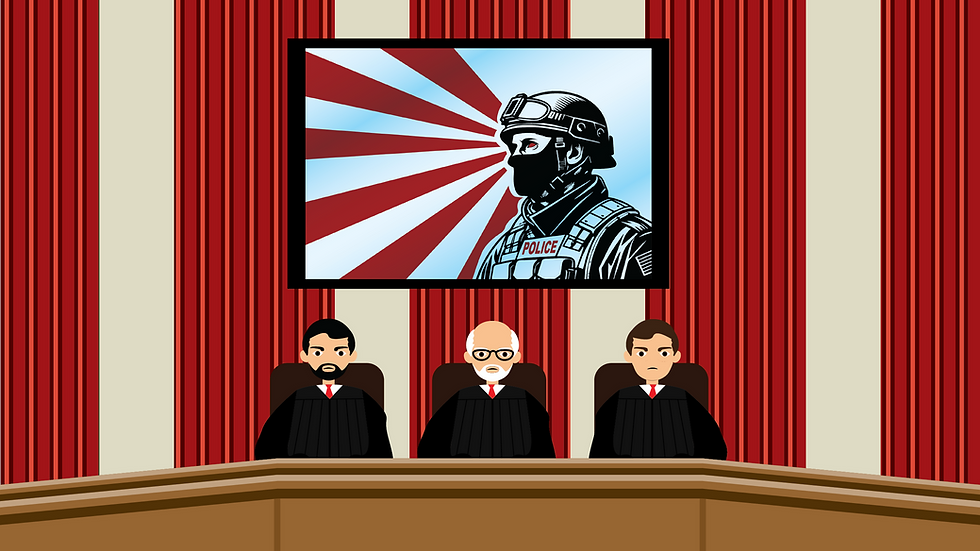Supreme Court decision strengthens protection against employment discrimination
- Kyle Ferreira

- May 22, 2024
- 3 min read
Updated: Nov 1, 2025

In a recent decision, Muldrow v. City of St. Louis, the Supreme Court stood against employment discrimination and strengthened the protections of Title VII of the Civil Rights Act.
Sergeant Jatonya Muldrow, a St. Louis police officer, was transferred from the prestigious Intelligence Decision to an administrative position and was replaced by a male police officer. Muldrow subsequently sued under the Civil Rights Act alleging that the St. Louis Police Department discriminated against her based on her sex.
However, the lower courts rejected the civil suit on the grounds that Muldrow didn't suffer significant enough harm to her employment from the transfer. On April 17, 2024, the Supreme Court overturned the lower court's decision and held that an employee claiming discrimination must show that they suffered some harm with respect to the terms or conditions of employment, but that harm need not be significant.
By rejecting a "significant harm" standard, the Supreme Court lowered the bar that employees who are discriminated against must meet to prevail against their employer. "This Court will not add words to the statute to achieve what the City thinks a desirable result", wrote the Supreme Court referencing the Civil Rights Act.
From 2008 through 2017, Muldrow worked as a plainclothes officer in the Department’s specialized Intelligence Division. Muldrow investigated public corruption and human trafficking cases, oversaw the Gang Unit, was deputized as a Task Force Officer with the Federal Bureau of Investigation and had other high-level responsibilities. In 2017, the new Intelligence Division commander asked to replace Muldrow with a male police officer. The Department approved the transfer against Muldrow’s wishes, reassigning her to a uniformed job supervising the day-to-day activities of neighborhood patrol officers. Muldrow’s rank and pay remained the same in her new position, but her responsibilities, perks, and schedule did not.
Muldrow challenged the transfer in a civil suit under Title VII of the Civil Rights Act, alleging that the police department discriminated against her with respect to the terms and conditions of employment based on her sex.
However, the lower courts viewed the situation differently. The district court ruled in favor of the city, holding that Muldrow had failed to demonstrate that the transfer caused her “significant” harm. On appeal, the 8th Circuit Court of Appeals did not disagree that Muldrow was discriminated against, however the 8th Circuit agreed with the district court’s conclusion that the Muldrow’s suit could not proceed because she had experienced “only minor changes in working conditions,” and concluding that to sue for employment discrimination an employee must show that the transfer resulted in "materially significant disadvantage."
The Supreme Court came to a different conclusion. To make a Title VII discrimination claim, the Supreme Court held in a 9-0 opinion, a transferee must show some harm or disadvantage respecting a term or condition of employment occurred. However, contrary to the lower courts' decision, the Supreme Court concluded that an employee does not have to show that the harm was significant, or serious, or substantial, or any similar adjective that implies the disadvantage must exceed a heightened bar.
By rejecting a "significant harm" requirement, the Supreme Court strengthened the protections of the Civil Rights Act by lowering the bar that employees who are discriminated against must meet to hold their employers accountable.
Under the Supreme Court’s "some harm" standard, disadvantages in employment terms and conditions that lower courts may previously have disregarded as insignificant—such as time, satisfaction, schedule, commuting costs, prestige, career prospects, networking opportunities, effects on family obligations, and the like—are sufficient to bring a discrimination suit against an employer.
The impact on future employment discrimination cases will be two-fold. First, the Supreme Court’s decision changes the legal standard used by lower courts in employment discrimination cases, specifically the courts that have adopted a “significant,” “material,” or “serious” harm requirement. Second, many cases will likely turn out differently, especially in situations where the disadvantage would previously have been considered "insignificant" or "immaterial."
The Supreme Court's decision will ultimately support the proper implementation of Title VII of the Civil Rights Act to effectuate its purpose of preventing unlawful employment practices and ensuring equal protection under the law.









